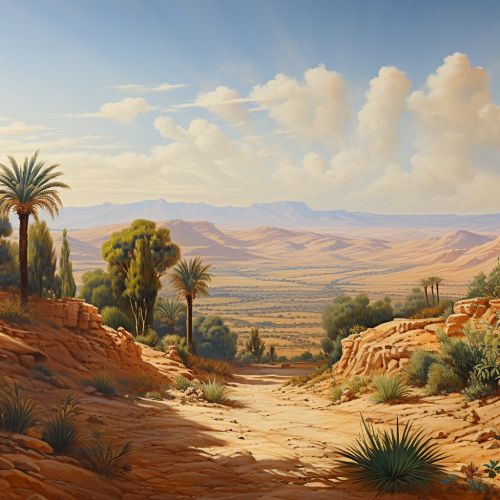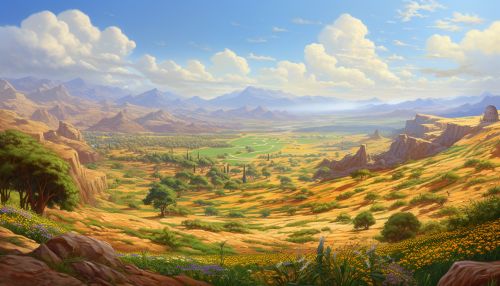North Africa
Geography
North Africa, a region encompassing the northernmost countries of the African continent, is bounded by the Mediterranean Sea to the north, the Atlantic Ocean to the west, and the Red Sea to the east. Its southern border is defined by the Sahara, the world's largest hot desert. This geographical positioning has shaped the history, culture, and biodiversity of the region.


Geology
The geological formation of North Africa is characterized by the African tectonic plate, which has played a significant role in shaping the region's diverse landscapes. The Atlas Mountains, which stretch across Morocco, Algeria, and Tunisia, are a result of the convergence of the African and Eurasian plates. The region also features extensive sedimentary basins such as the Nile Delta basin, which have been shaped by millions of years of river deposition.
Climate
The climate of North Africa is predominantly arid, with the Sahara Desert influencing much of the region's weather patterns. However, the coastal regions experience a Mediterranean climate, characterized by hot, dry summers and mild, wet winters. The region's climate plays a significant role in its biogeography, influencing the distribution and diversity of plant and animal species.
Biodiversity
Despite the arid conditions, North Africa boasts a rich biodiversity. The region is home to a variety of endemic species, particularly in the Atlas Mountains and the Mediterranean coastal regions. The Sahara Desert, while inhospitable to many forms of life, supports a range of adapted species such as the Fennec Fox and the Dromedary Camel.
History
North Africa has a rich and complex history, with human habitation dating back to the Paleolithic era. The region has seen the rise and fall of several powerful civilizations, including the ancient Egyptians, Carthaginians, and Romans. In the medieval period, North Africa was a center of Islamic culture and learning, with cities like Cairo and Fes playing key roles in the Islamic Golden Age.
Culture
The culture of North Africa is a blend of indigenous Berber, Arab, and other influences. The region is known for its rich traditions in music, art, and cuisine. The Berber heritage is particularly strong in the Atlas Mountains, while Arab culture predominates in the cities and coastal regions. The region's culture has also been shaped by its historical connections with Europe and the Middle East.
Economy
The economy of North Africa is diverse, with agriculture, mining, and tourism playing key roles. The region is rich in natural resources, including oil and natural gas, particularly in Algeria and Libya. Agriculture is a major economic activity, with the Nile Delta being one of the most productive agricultural areas in the world. Tourism is also a significant sector, with Egypt's ancient monuments and Morocco's historic cities attracting millions of visitors each year.
Demographics
North Africa is home to a diverse population, with Arabs and Berbers being the largest ethnic groups. The region is predominantly Muslim, with Islam playing a central role in the culture and society. The region's languages include Arabic, Berber languages, and French, a legacy of the colonial period.
